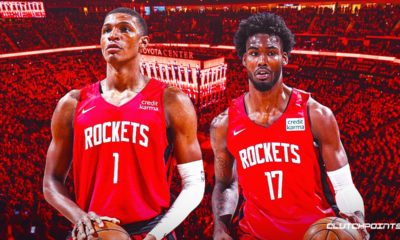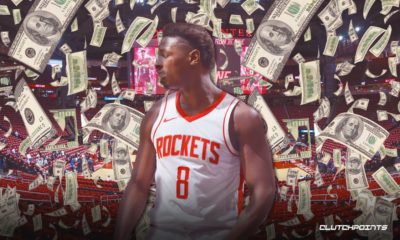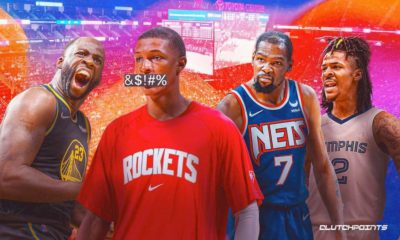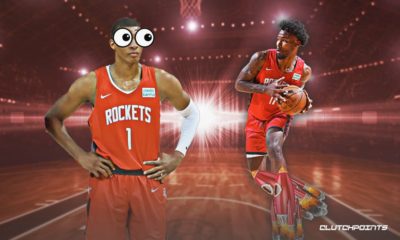Rockets
Ranking the dumbest moves by all 30 NBA franchises since 2000
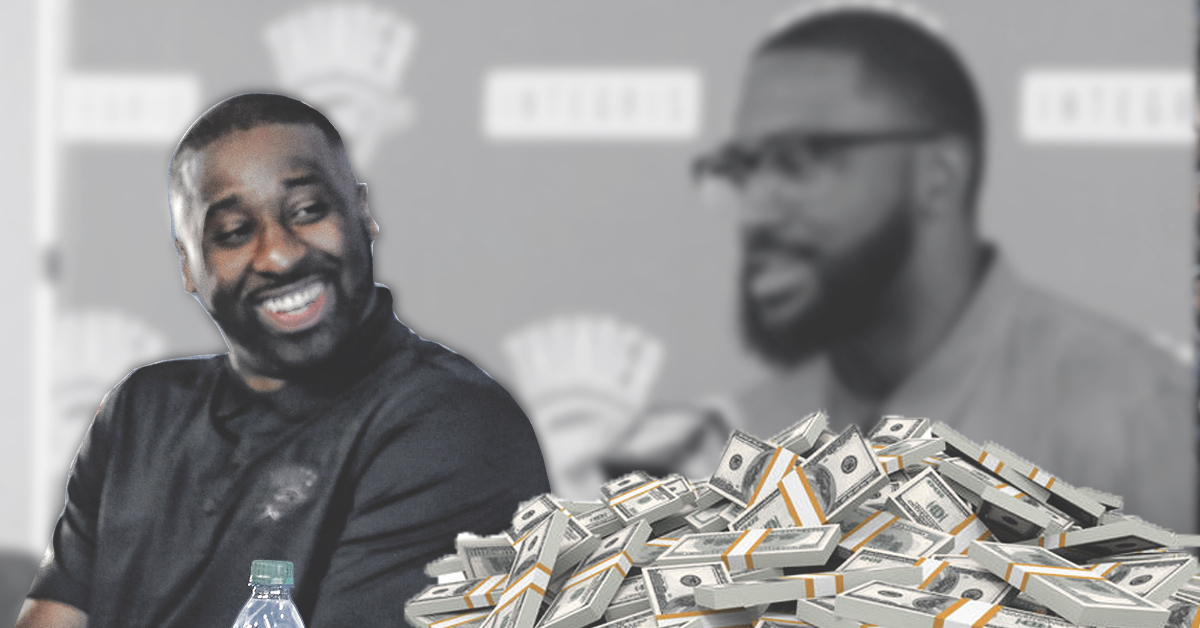

Really good basketball organizations do not magically appear in the NBA. They are a result of hard work, foresight, good decision making, and sometimes a little bit of gambling. Some reap the rewards while others the disaster. There is no exemption to this rule.
Even some of the best and most successful organizations had a fair share of dreadfully dumb decisions that altered their supposed basketball fate.
Ranking them from bad, worse, to a complete disaster, here are the dumbest decisions from each NBA organization since 2000.
Golden State Warriors
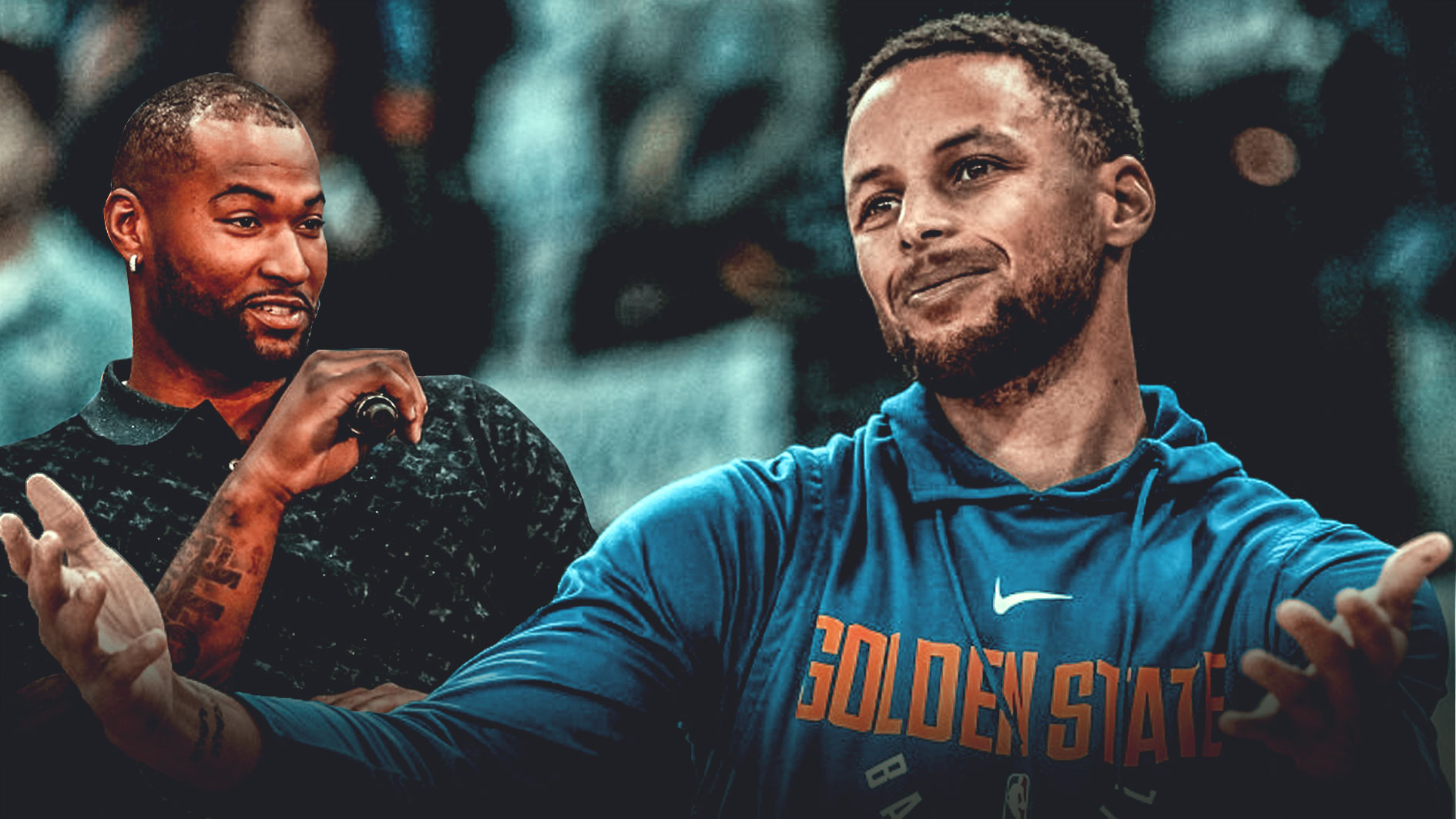
30- Dismantling the “We Believe” Team, 2007
One of the greatest NBA underdog stories to date. The eighth-seeded Golden State team was comprised of a bunch of individuals with a lot to prove like Baron Davis, Stephen Jackson, and Jason Richardson.
They were never expected to make the playoffs, let alone beat the mighty first seed, Dallas Mavericks with prime Nowitzki and fringe All-star Josh Howard at its helm.
They made history and beat the Mavericks 4-2. They never gave this group another chance. Traded Jason Richardson to the Bobcats over the summer, and let the remaining “We Believe” core pieces decline and walk two seasons after.
Charlotte Hornets (former Bobcats)
29- Drafting Adam Morrison, 2006
The Bobcats were the new expansion team on the block, and they needed a lot of talent to build on. They were to pick third overall in the 2006 NBA draft that brought us marquee names like LaMarcus Aldridge, Rudy Gay, Rajon Rondo, and Kyle Lowry.
They picked Gonzaga hotshot Adam Morrison, whose duration only lasted a career 161 games in a combined four seasons. Former Portland star Brandon Roy was the sixth pick of this draft.
Dallas Mavericks
28- Trading for Erick Dampier, 2004
Dallas needed a big man. A sign and trade was arranged that sent Dampier to Dallas. It did not look too bad considering his 12.3 points, 12 rebounds, and 1.9 block average with the 2003-04 Golden State Warriors.
Fortunately for him, that was his contract year. He played well enough for Dallas to fork $73 million in seven years. The bad thing is his hefty price tag never translated on the court.
His average with six seasons in Dallas is 6.5 points, 7.6 rebounds, and 1.3 blocks. A price too high to pay for a center that can’t even get double digit rebounds.
Denver Nuggets
27- Drafting Nikoloz Tskitishvili, 2002
What do Amar’e Stoudemire, Caron Butler, and Tayshaun Prince have in common? They were all selected 2002 draft night after fifth overall pick Nikoloz Tskitishvili.
His name does not ring a bell? For six NBA seasons and 172 games under his belt, his career averages are 2.9 points and 1.8 rebounds. Forgetting him is not your fault.
Toronto Raptors
26- The Hedo Effect, 2009
To be fair, Hedo Turkoglu was one of the coveted high profile free agents. He was coming off a Most Improved Player campaign going deep into the playoffs.
An average of 16.8 points, 5.3 rebounds, and 4.9 assists for the Dwight Howard led Orlando Magic was nothing to sneeze about despite being manhandled by the Lakers in the Finals.
Acquiring Hedo with this contract was a definite overpay. The Raptors were ok about it because they were making him a sacred cow offering to Chris Bosh that would convince him to stay.
Things went south from there. Bosh eventually walked and Hedo was a shell of himself. Uninspired play and roster issues just made him lackluster. Mid 2010, he was finally traded to the Suns for Leandro Barbosa and Dwayne Jones.
Memphis Grizzlies
25- Drafting Hasheem Thabeet, 2009
The allure of physical gifts is sometimes deceiving. I would get nightmares knowing I passed on these high profile names: James Harden, Stephen Curry, and DeMar DeRozan.
Their All-star nods together are 15 selections compared to Thabeet’s none.
With a career 2.2 points, 2.7 rebounds, and 0.8 blocks, he bounced around the league with three other teams before he called it quits.
Boston Celtics
24- Joe Johnson’s release from Beantown, 2002
The legend of Iso Joe was not born during this time, so maybe the Celtics should get a pass?
Hold that thought, and just imagine prime Paul Pierce, Antoine Walker, and Joe Johnson together. There could have been a big three in Beantown before the Big 3.
To cut the long story short, they shipped a young guard named Joe Johnson to the Suns for Rodney Rodgers, Tony Delk, and peanuts.
Joe Johnson is a 7-time former All-star with a career average of 16 points, 4 rebounds, and 3.9 assists.
Milwaukee Bucks
23 The Glove and Jesus Shuttlesworth change places, 2003
It seemed like an All-star shooting guard was being dealt for an All-star point guard. Win-win, right?
Pulling the strings was former Buck head coach George Karl. Karl had a reputation of straining relationships with players he did not like. In short, they shipped out their 27-year-old franchise player who was in his prime, due to internal issues.
He was averaging 19.4 points, 4.6 rebounds, with a marksman-like 40 percent clip from the three-point line before he was traded to the Seattle Supersonics. The future Hall of Famer won two championships, one with the Boston Celtics and the other with the Miami Heat.
Fellow future Hall of Famer Gary Payton became a rental and walked to the Lakers the season after.
Detroit Pistons
22- The Josh Smith Experiment, 2013
It feels like an eternity knowing that Josh Smith was pretty relevant 5 years ago. Joe Dumars was on the bubble for having a prolonged postseason drought. He was desperate for prime talent.
Instead of going for what they really needed, which were shooters; they settled for the best free agent pick during that time.
Talent-wise, Josh Smith seemed like the answer for a struggling Piston team. He led Atlanta with 17.5 points, 8.4 rebounds, 4.2 assists, 1.8 blocks, and 1.2 steals. The Pistons signed him to a $54 million, four-year contract, which they would eventually regret. Their roster was an obvious clunky fit for Smith, who is used to playing power forward.
Forced to play small forward due to the emergence of Monroe and Drummond, Smith never got his shots to go efficiently. He was never an efficient scorer, to begin with.
Forced plays and three ball jacking ultimately pulled the plug on the experiment. During the latter part of 2014, he was waived, and the stretch provision was used on the remaining $27 million in his contract.
Utah Jazz
21- Losing Gordon Hayward, 2017
This may have happened last season, but the real of cause goes a couple of years back.
The Utah Jazz was on the fence with what to do with Hayward. He was in no way a bad player, but he was not that great at the time. He was averaging 16.2 points, 5.1 rebounds, 5.2 assists, and 1.4 steals per game during the 2013-14 season.
Instead of locking him in for the long haul, they took a gamble on him as a restricted free agent and decided to match the offers Hayward would get. In return, they retained Hayward’s services for a few more years, but let him ogle the market for offers. It all led to his 2017 departure to Boston, with his college coach, Brad Stevens.
Putting a max contract out from the beginning might have spared them from losing one of the best two-way wings in the league.
San Antonio Spurs
21- Supposed Argentinian Dynamic Duo, 2007
The Argentinian national team slowly established itself as a basketball powerhouse in the 2000s. From its emergence at FIBA to winning the Olympic gold medal in 2004, they were making their mark in the league. With Manu Ginobili showcasing his European style of basketball brilliance, it would be natural that the Spurs would want his friend and fellow Argentinian, Luis Scola to play alongside him.
Scola was a different kind of bruiser at the power forward slot. A mix of strength, grace, and craftiness made him an elite talent during that time. He was a highly decorated basketball figure in the European leagues.
The 56th overall pick of the 2002 draft, Scola was ready to make the leap, but a buyout from his current team proved too steep for the Spurs, thus robbing us of a potential Argentinian one-two punch. Who knows how many more titles would the Spurs have won with him on board.
It took five more years to make Scola’s dream a reality. Scola’s debut happened when his rights were traded to the Rockets in 2007.
Washington Wizards
18- The Gilbert Arenas Contract
Agent Zero had the talent and flair to be a superstar in the league. His 2006-2007 season was arguably his best with averages of 28.4 points, 4.6 rebounds, and 6 assists per game.
With the Wizards struggling with relevance, they inked the three-time All-star gunner (pun intended) to a $111 million, 6-year contract. A knee injury derailed his 2007-2008 season, playing for only 13 games. If you thought things could not go any worse for the Wizards, you might be mistaken.
Arenas had a thing for storing his guns in the locker room. He and teammate Javaris Crittenton had an argument over gambling debts, one thing led to another, allegedly guns were involved.
He was faced with a long suspension and it went downhill from there. Soon traded to the Orlando Magic once he got back for an equally horrendous contract in Rashard Lewis, he was quickly waived under the amnesty clause. He has not stepped on the NBA hardwood since 2012.
Orlando Magic
18- The Rashard Lewis Contract, 2007
Intertwined by their bad contracts, it would just be fitting that Gilbert Arenas and Rashard Lewis come after each other. Lewis was a 2-time Allstar. A scorer who can get it done from beyond the arc, he had the physical tools to be something special. Although he was good in his own right, he was never really destined for greatness.
It was 2007, Dwight Howard was peaking in Orlando, and Stan Van Gundy needed a perimeter ace to have that inside-outside combo.
They snagged Lewis via sign-and-trade and offered him a $118 million contract in 6 years. After a year or two, the Magic was faced with the reality that they doled out franchise player money to a player who played below his pay grade.
They wanted his contract out so bad, that they traded him for Gilbert Arenas in 2010. A player who had a less bad contract than he did.
Atlanta Hawks
17- The Joe Johnson Contract, 2010
It was bad, but you can’t blame the Hawks for wanting a superstar that much. Relevance in this league revolves around the star power of players.
Summer of 2010, they could offer more money to Johnson than any team could offer. They went deep into the playoffs and felt that giving it another crack with the old crew would get the championship. So they did just that, have the gang back together.
Not to knock on Johnson’s talent and ability, but you cash in chips like that when you are getting a proven franchise altering piece that improves your championship chances.
Johnson was still producing All-star numbers for two more seasons in Atlanta, just not enough to get his Hawks by the opening round of the playoffs. They shipped him and his huge contract out to the Brooklyn Nets in 2012.
16- New York Knicks
Going big on Bargnani, 2013
Coming from a deeper than expected playoff run, the Knicks needed more talent to keep up in the east.
Carmelo Anthony had a solid supporting crew in JR Smith and Tyson Chandler, but with Amar’e Stoudemire slowly declining with health issues, they needed to make a splash. And splash they did. Snagging a former overall 1st pick doesn’t sound too bad right? An underperforming big man with a bad contract sounds bearable. A change of scenery might do him good, right?
His two-year stint with the Knicks got him an average of 13.9 points, 4.9 rebounds, and an atrocious 30 percent clip from the deep ball.
OK, we had a feeling he would be bad. We were not expecting the rise of a second Nowitzki from him.
To make things worse they gave up Knick reserves Steve Novak, Marcus Camby, Quentin Richardson, a 2016 first-rounder, and 2014 and 2017 second-rounder all to acquire his services.
15- Philadelphia 76ers
The Andrew Bynum Experience, 2012
It was a good call in hindsight. Going on all in on a young, up and coming All-star big man who averaged 18.7 points, 11.8 rebounds, and 1.9 blocks is sound logic. The 76ers acquired Bynum in a 4-team trade involving the Nuggets, Lakers, and Magic. They lost their best player, Andre Iguodala to the Nuggets.
We know how it ended for the 76ers. Andrew Bynum got injured on a freak bowling incident. He never laced it up on the court. Not even once.
Getting or how Bynum was acquired was not the bad thing. The unsolved mystery, in this case, is how the medical team never saw these red flags acquiring him.
All the hype and trouble everybody got into just to see this crash and burn. Or was this Hinkie’s plan all along for starting “The Process”. The mystery continues.
14- Chicago Bulls
Moving up for Doug, 2014
The Bulls management fell in love with Doug McDermott. Coming out of Creighton as a senior, he led the nation in scoring with 26.7 points per game. They oversold McDermott to themselves, believing he could be more than a perimeter ace. The assets that they had to give up for him reinforce the belief the management had for him.
They traded their 16th and 19th pick to the Nuggets in exchange for McDermott who was 11th. The Bulls picks translated to Jusuf Nurkic and Gary Harris. Nurkic now serves as the Blazers’ two-way anchor in the middle. He averaged 14.3 points, 9 rebounds, and 1.4 blocks per game last season.
An important cog to the Nuggets’ attack, Harris had a breakout year last season. He averaged 17.5 points on a near 40 percent clip from beyond the arc.
McDermott has been bouncing around the league as a sniper for hire. He enters this upcoming season with his fifth team, the Indiana Pacers. He averages a career 7.9 points on a 40 percent rate from downtown.
13- Indiana Pacers
Hill – Leonard swap, 2011
This looks bad, due to what Kawhi Leonard turned out to be. A 2-time All-star, 2-time All-NBA selection, 2-time Defensive Player of the Year, an NBA champion, and a Finals MVP, this is what he has accomplished so far in his young 7-year career.
George Hill was a valued piece and a Greg Popovich favorite. Drafted and developed out of the Spurs camp, the Pacers felt that Hill was the missing piece of the puzzle.
The Pacers were a powerhouse in the East with the likes of Paul George, Danny Granger, Roy Hibbert, and David West. The Problem was the LeBron James’ Heatles were in their way. The Pacers needed someone to captain the pieces that they had. They pulled the trigger on the trade, and the rest is history.
The Pacers still fell to the Heat. The Spurs got their new superstar.
Just imagine the defensive chaos a Paul George-Kawhi Leonard pairing in Indiana could do to the opposing team.
12- Phoenix Suns
Three-headed point guard monster, 2015
In today’s position-less basketball, seeing dual point guard lineups are not too uncommon. During that time, however, having a stockpile of good guards is a recipe for disaster. How did this monster come to fruition? Goran Dragic signed as a free agent with the Suns in 2012. A 3-team trade sent Eric Bledsoe to the Suns in 2013. Isaiah Thomas joined the party in 2014 via trade from the Kings.
When you have potentially three starting point guards on your team, playing time and rotational fits start becoming an issue. The point guard extravaganza blew up on 2015, with Goran Dragic being vocal about his unhappiness with the team.
One thing led to another, they shipped out Dragic to the Heat and Thomas to the Celtics. But the point guard madness did not end there. The Suns took in Brandon Knight from a 3-team trade with the Bucks and 76ers.
It was a dumbing phase for the Suns because their roster moves really had no direction. Instead of disposing assets for picks, they tried to be relevant in the deep western conference. If they focused on developing talent early on this might have been a different story.
11- New Orleans Pelicans (former Hornets)
Losing Chris Paul for nothing significant, 2011
After Chris Paul’s 2011 contract year there was a proposed 3-team trade that would send him to the Lakers. It was vetoed by then-NBA commissioner David Stern due to “basketball reasons”.
It should have sent Lamar Odom from the Lakers, Luis Scola, Kevin Martin, Goran Dragic, and a 2012 first rounder from the Rockets to the Hornets. Lakers would pair Paul with Kobe and Rockets get their new big man in Pau Gasol. New Orleans and Paul went with the other Los Angeles team, the Clippers. They received Chris Kaman, Eric Gordon, Al-Farouq Aminu, and a 2012 first-rounder from the Timberwolves.
For trading someone of the Point God’s talent this was a heist by the Clippers. The disaster eventually was a blessing in disguise, because they wouldn’t snag Anthony Davis if they were not such a bad team after.
10- Houston Rockets
Signing Dwight Howard, 2013
It was a brilliant idea on Dwight Howard’s end to sign with the Rockets. New stomping ground and no Kobe Bryant breathing down his neck. He could not take the pressure as a Laker.
It went well for his first year as a Rocket. It was an All-star season for him averaging 18.3 points, 12.2 rebounds, and 1.8 blocks per game. It seemed like the old Howard was back.
Unfortunately, that was not the case. Old Howard was top dog in Orlando. Not this time around. An All-star who was putting up fringe MVP numbers, the Rockets was James Harden’s team.
That grew on Howard. He was unhappy with his role as second fiddle. He wanted more post touches on offense, but the system ran on Harden’s ability to create.
He could not set aside his ego for the team. After two more seasons in Houston, the drama he wished to avoid in Los Angeles he brought to Houston. It signaled the end of the Dwight era.
This was a dumb move not because they signed a talented big man like Dwight Howard or he did not produce. Dwight had well documented red flags regarding his maturity and attitude with his tenure with Magic to the Lakers.
9- Minnesota Timberwolves
Roy for Foye, 2006
Oh draft night 2006, you hold so much wonder, intrigue, and blunders of sorts. The Wolves pulled a page out of the Chicago Bulls playbook and pulled a LaMarcus Aldridge. Brandon Roy was straight up traded for Randy Foye.
In his six seasons in the NBA, Roy was Rookie of the Year, 3-time All-star, and a 2-time all NBA selection. His career average with the Blazers was 19 points, 4.3 rebounds, 4.7 assists, and 1 steal per game.
Not to demean his talent, Randy Foye was a decent starter at best. His career average per game when Roy was around was 11.7 points, 2.4 rebounds, and 3.4 assists.
Roy was just around for 6 seasons. His retirement was due to medical reasons, although it was clear that Roy was the player you could build a franchise around.
If the Wolves kept him, we would have witnessed a KG and Roy pairing that would have brought something exciting in Minnesota.
8- Los Angeles Clippers
Missing out on Kyrie Irving, 2011
Having a lot of cap space is such a boon for teams. The Clippers had the right idea in disposing Baron Davis’ bad contract. He was riddled with injuries and on a decline as well. $28 million over two seasons was not an easy pill to swallow.
They pulled the trigger on a deal with the Cavs. Clippers get Mo Williams and Jamario Moon, while the Cavs get Baron Davis and their 2011 first-round pick.
That pick turned out to be Kyrie Irving. Irving is just a 5-time All-star, an All-NBA selection, and an NBA champion with career averages of 22 points, 3.4 rebounds, 5.5 assists, with a 38 percent clip from beyond the arc. I bet that saved cap space still haunts their dreams.
7- Portland Trail Blazers
Picking Greg Oden, 2007
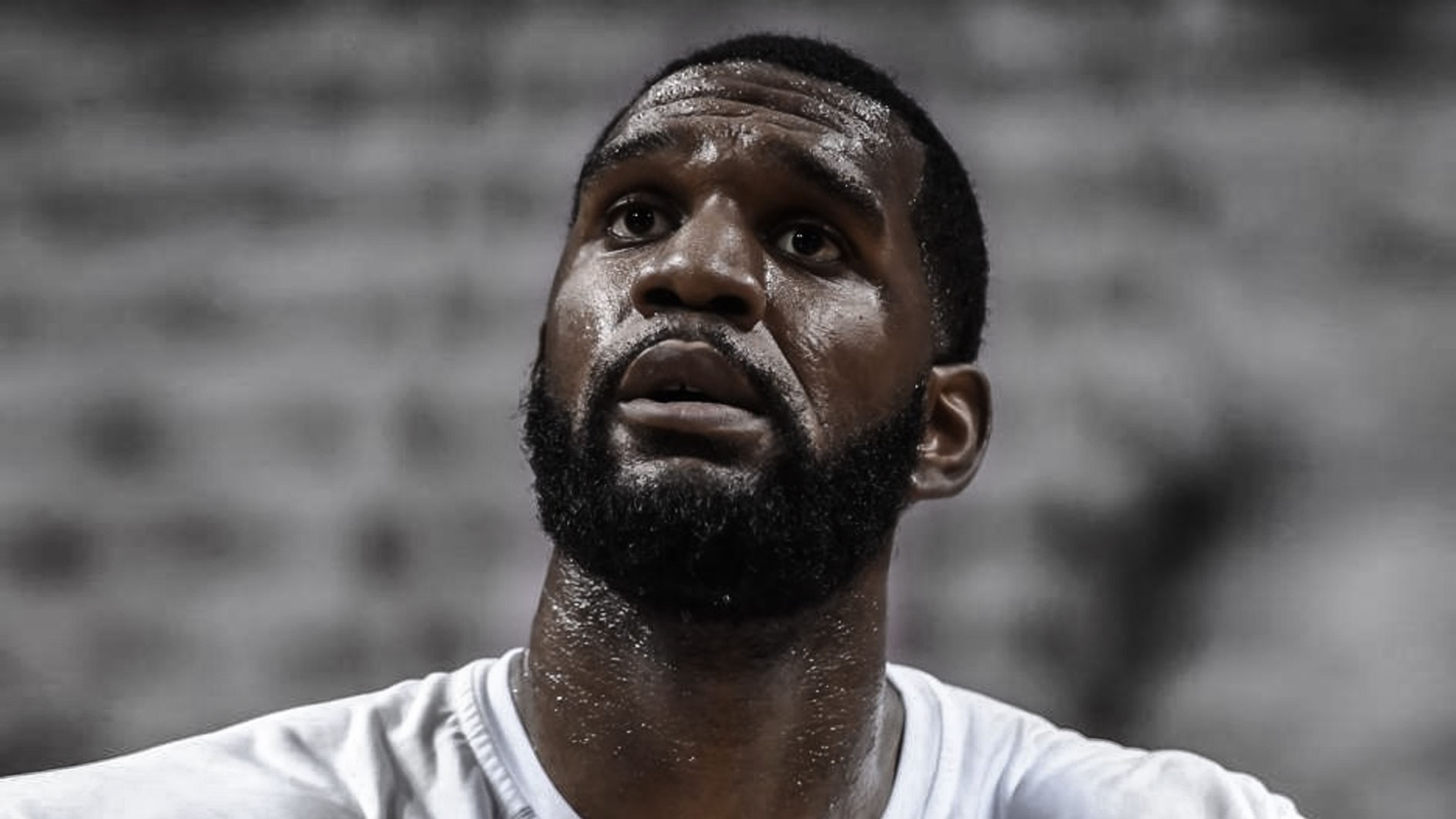
The Blazers had their fair share of bad luck with their picks. Missing out on his Michael Jordan would be the most gut-wrenching one. Since we are on the year 2000s, the next worse thing to happen would be on the 2007 draft.
I’ll be honest. Greg Oden was a beast when he was healthy. Coming out of Ohio State, he was mostly the consensus top pick. He has all the physical gifts to be a generational talent. Size, speed, strength, and skill were there for them.
On the other hand, there was Kevin Durant. An extremely talented prospect, but people were turned off by his non-NBA ready built. It was clearly a choice between the two.
The Blazers went with their immediate need, which was a center. Oden was the top pick. In a sad twist of fate, history repeats itself. Someone should remind the Blazers that big humans are prone to big injuries.
With that, I believe the Blazers knew what they were getting, or they should probably get a new medical team with all these injuries going around their camp.
6- Miami Heat
The Decision Part 1, 2010
This will be the only entry not about a bad contract or a failed pick, but on how an organization allowed an action in this kind of manner.
LeBron James was a free agent at this time. He took his talents to South Beach to form a Big 3 with Dwyane Wade and Chris Bosh. Perfectly sound decision.
It could have been an easy and respectable migration. No fuss or drama. Instead, he had a TV special done to announce his future plans. It caught everyone by surprise. This move caught not only the ire of Cavalier fans all around, but some of the league as well. His championship promises with Miami added more fuel to the fire he already started.
The amount of hate and shade that was thrown at James, he went from hometown hero to villain in an instant. There was already a target on the Heat’s head before the season even started.
I am a sucker for theatrics, but the Heat should have watered this down and focused on what really mattered which was basketball.
5- Los Angeles Lakers
Shaq and Kobe Split, 2004
One of the best questions to throw out there are the “What if?” questions. Two of the biggest names in Laker lore, Shaquille O’Neal and Kobe Bryant, they were an unstoppable duo on the court. They dominated the league together. Three consecutive NBA championships from 1999-2002 prove that.
One thing was also proven; they did not like each other. This is on this list because if the Lakers managed to set their egos aside, there would have been more than 3 championships during that era. You just don’t break up a dominant force like that.
What if Shaq and Kobe set their differences aside and played beyond 2004? What if they got along during the three-peat? We will never know.
4- Sacramento Kings
Trading DeMarcus Cousins for less, 2017
Disgruntled or not, DeMarcus Cousins is arguably the best center in the NBA right now when healthy. Before his latest injury, he was posting 25.2 points, 12.9 rebounds, a steal, and a block per game for the Pelicans.
Bearing with that kind of talent did not come with quirks. He was a hothead. Temperamental and emotional, he wore his heart on his sleeve. It is something that could inspire or poison a team.
His previous team, the Sacramento Kings, did not take any more chances. As league cellar dwellers, they wanted to start with a winning culture from the ground up. That meant a reboot, which ended in sending their best player to the Pelicans.
The Pelicans sent out Tyreke Evans, Langston Galloway, Buddy Hield, a 2017 first-rounder, and a 2017 second-rounder. The Kings sent out Cousins and Omri Casspi in return.
Not exactly a king’s ransom for a player of Cousin’s caliber. They could have held out for better offers, but I guess they wanted rebuilding now than later.
3- Oklahoma City Thunder
Trading James Harden, 2012
Not all teams have pockets as deep as the large market cities. Salary cap juggling is an art of its own. Sometimes the management resorts to penny-pinching; unknowingly it could cost a franchise.
James Harden was coming off a contract season. The Thunder had a deep playoff run but unfortunately lost to the Heat in the Finals. It would just make common sense to keep the core together and give it another go, right?
Thunder General Manager Sam Presti felt that Harden was just worth $55.5 million over four years. It was $4.5 million less than what Harden was expecting. A disagreement on the offer prompted a trade that would send Harden to the Rockets.
Along with Harden, the Thunder sent Cole Aldrich, Daequan Cook, and Lazar Hayward to the Rockets. In return, they got Jeremy Lamb, Kevin Martin, a 2013 first-rounder, a 2013 second-rounder, and a 2014 first-rounder. If only the Thunder paid the man his money, we could have seen more from a deadly scoring trinity of Durant, Westbrook, and Harden.
Nowadays, James Harden is the reigning MVP. He averaged 30.4 points, 5.4 rebounds, 8.8 assists, and 1.8 steals per game last season.
1- Cleveland Cavaliers
Anthony Bennett bust, 2013
Anthony Bennett as the 1st pick overall was a definite surprise, not only to the league but also to him. But in a draft where nobody was clearly ahead of the pack, it was a gamble.
Coming out of UNLV, it was obvious that his offensive skills were polished for the college level. He could post up, drive, shoot the three, and more. Unfortunately, that polish did not translate to defense. He was a liability on defense. He rarely played defense.
Despite that glaring flaw, scouts ignored it in favor of his offensive tools. He is undersized for a power forward, but with some work, he can build a physique that will make it work in the NBA.
Sadly, there was no way to gauge his willingness and effort. A flaw nobody saw coming from Bennett. He did not work hard enough on his game and conditioning to fit the bill of being the top pick.
He is arguably the worst 1st overall pick in history.
1- Brooklyn Nets
Going all in on Boston Big 2, 2014
Mikhail Prokhorov wanted to buy himself into the playoffs, instead of building a roster from the ground up. Which did not seem a problem, until washed up stars for the soul of the Brooklyn Nets was offered on the table.
The Celtic Big 3 was dismantled as quickly it was formed. Ray Allen was off to the Heat to join LeBron, while Kevin Garnett and Paul Pierce were headed to the Nets.
Boston got Gerald Wallace, Kris Humphries, MarShon Brooks, Kris Joseph, Keith Bogans, 3 first-rounders (2014, 2016, and 2018), and the right to swap first-rounders in 2017.
Having Joe Johnson, Kevin Garnett, and Paul Pierce does not seem so bad.
If the youngest player of your Big 3 is 33-years-old, and the accumulated age of the Big 3 is above 100 years, there might be a slight problem.
The picks that the Nets forked over translated into drafting Jaylen Brown, Jayson Tatum, and acquiring Kyrie Irving.
Impatience is a bad thing in the NBA.
The post Ranking the dumbest moves by all 30 NBA franchises since 2000 appeared first on ClutchPoints.






